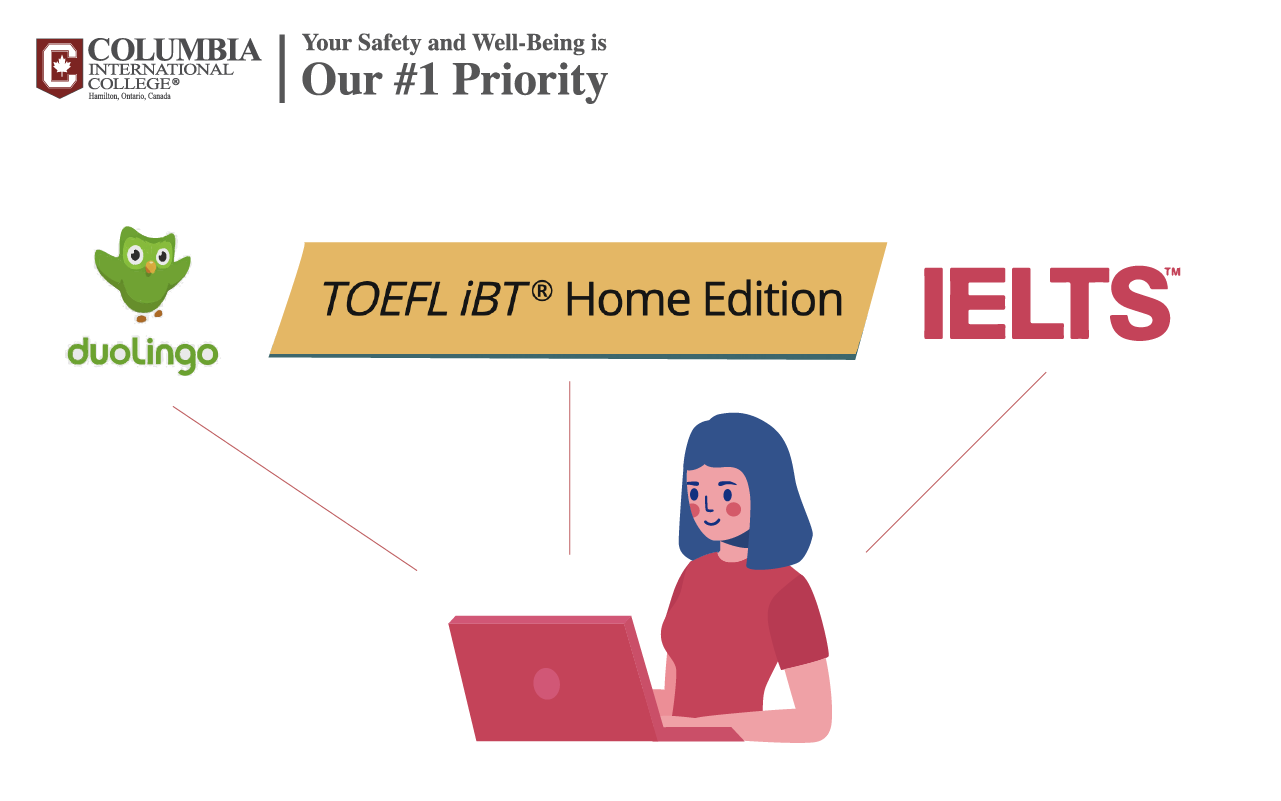Fulfilling English Language Requirements

Universities require English Proficiency Test scores from any student whose English language skills are in doubt. English Proficiency Tests determine whether a student has the English skills they need to study at university.
Many universities do not admit students until the English Proficiency Requirement has been satisfied.
The most popular tests you can take are:
- TOEFL – Test of English as a Foreign Language (www.ets.org/toefl)
- IELTS – International English Language Testing System (www.ielts.org)
- CAEL – Canadian Academic English Language Assessment (www.cael.ca)
- COPE – Certificate of Proficiency in English (www.copetest.com) (can only be taken at the University of Toronto St. George campus and recognized for admissions to U of Toronto’s three campuses and OCAD University)
- Duolingo – An online option and an alternative to other standardized proficiency tests and the scores are correlated to those of TOEFL or IELTS. (www.englishtest.duolingo.com)
For details about English proficiency requirements for Canadian universities, please refer to the chart of “English Proficiency Requirements for Ontario Universities” and “Outside Ontario University Admissions”.
Who Has To Write An English Language Proficiency Test? You likely have to write a language proficiency test if:
- English is not your first language
- You haven’t spent more than four years full-time in an English-speaking education system (some universities may only require three years)
- Even if you have spent more than three or four years studying in a full-time academic English language program, some universities may still request proof of English proficiency. You can appeal the request, and please talk to or email your University Placement Counsellor for assistance.
How Do I Send English Language Proficiency Scores to Universities?
- You must arrange to have your English Proficiency Scores sent directly from the testing centre as universities only accept official documentation from the language testing centre.
- You cannot send your scores yourself nor can you ask your University Placement Counsellor to send these scores for you. Contact us if you have questions about sending your test scores to universities.
IELTS
CIC is an official testing centre for IELTS. It is highly recommended that you register for the test as soon as possible in the External Testing Office (ETO) located in the Guidance Office (AW-N101) as test spots fill up quickly! If you have any questions about the test, go see the ETO staff or email to: eto@cic-totalcare.com.
IELTS tests are available on many dates in a year. Tests are normally taken on Saturdays, with some sessions on other days. The Listening, Reading and Writing tests are all taken on the same day. The Speaking test can take place up to seven days before or after the other modules; this is decided by the centre.
To register for an IELTS test, you need to submit your application form at least 1 week before the test date. The test centre will confirm your IELTS test date and time. If the speaking test is to be on a different day, the centre will tell you this. For more information visit our website http://www.cic-totalcare.com/en/ielts/.
For applying to universities/ community colleges, please take the Academic test.
Below is the test dates schedule available at CIC in 2024.
|
Date |
Type | Registration Deadline |
| January 6
January 13 January 27 |
Academic
General & Academic General & Academic |
January 4
January 11 January 25 |
| February 3
February 17 February 24 |
General & Academic
General & Academic Academic |
February 1
February 15 February 22 |
| March 9
March 16 March 23 |
General & Academic
Academic General & Academic |
March 7
March 14 March 21 |
| April 6
April 13 April 27 |
General & Academic
Academic General & Academic |
April 4
April 11 April 25 |
| May 4
May 18 May 25 |
Academic
Academic General & Academic |
May 2
May 16 May 23 |
| June 8
June 22 |
General & Academic
General & Academic |
June 6
June 20 |
| July 6
July 27 |
General & Academic
General & Academic |
July 4
July 25 |
| August 17
August 24 |
Academic
General & Academic |
August 15
August 22 |
| September 14
September 28 |
General & Academic
General & Academic |
September 12
September 26 |
| October 5
October 19 October 26 |
General & Academic
Academic General & Academic |
October 3
October 17 October 24 |
| November 2
November 16 November 23 November 30 |
Academic
General & Academic Academic General & Academic |
October 31
November 14 November 21 November 28 |
| December 7
December 14 |
General & Academic
General & Academic |
December 5 December 12 |
Reminder: Have your passport ready when you register for the test! On the test date, please bring your registered passport and student ID with you.
Last Updated on December 20, 2023.
